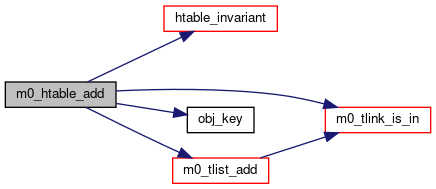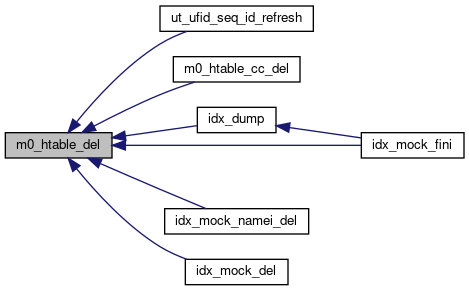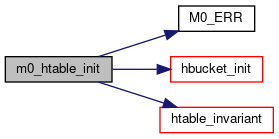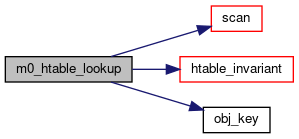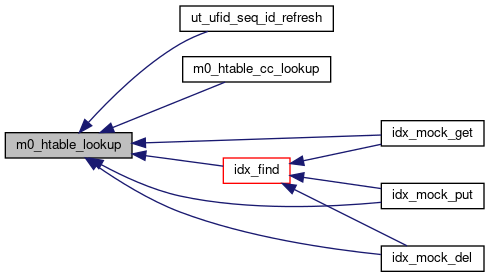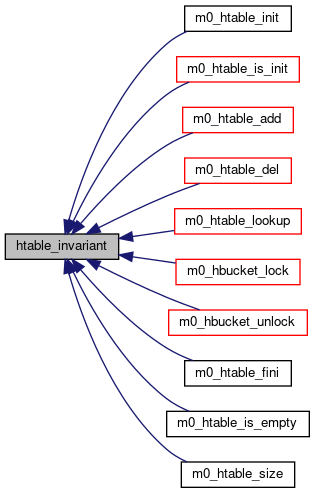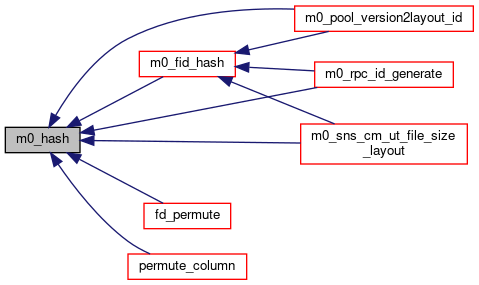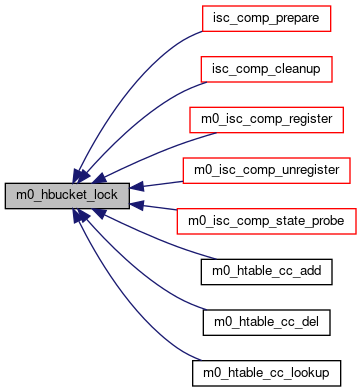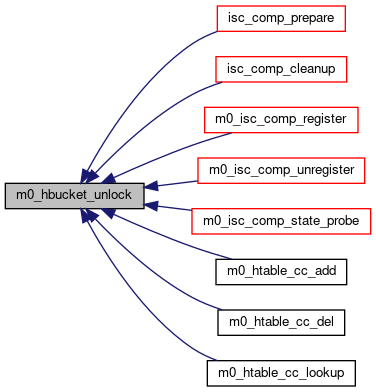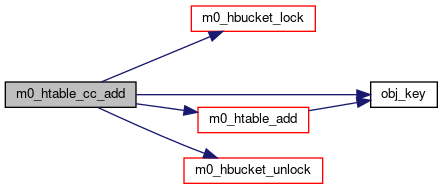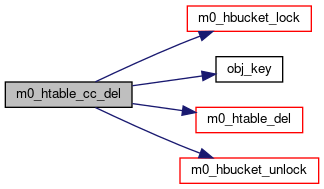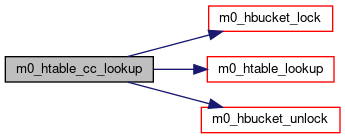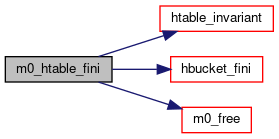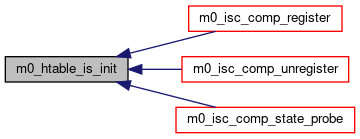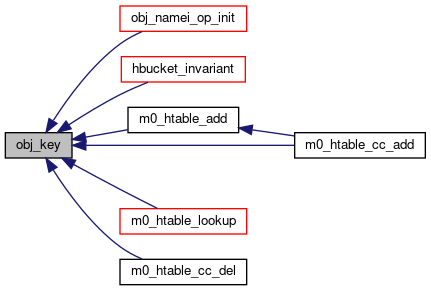|
| #define | M0_TRACE_SUBSYSTEM M0_TRACE_SUBSYS_LIB |
| |
| #define | M0_HT_DESCR(name, amb_type, key_field, hash_func, key_eq) |
| |
| #define | M0_HT_DESCR_DEFINE(name, htname, scope, amb_type, amb_link_field, amb_magic_field, amb_magic, head_magic, key_field, hash_func, key_eq) |
| |
| #define | M0_HT_DESCR_DECLARE(name, scope) scope const struct m0_ht_descr name ## _ht |
| |
| #define | M0_HT_DECLARE(name, scope, amb_type, key_type) |
| |
| #define | M0_HT_DEFINE(name, scope, amb_type, key_type) |
| |
| #define | m0_hbucket_forall(name, var, bucket, ...) |
| |
| #define | m0_htable_forall(name, var, htable, ...) |
| |
| #define | m0_htable_for(name, var, htable) |
| |
| #define | m0_htable_endfor m0_tl_endfor; }; }) |
| |
| #define | m0_hbucket_for(descr, var, bucket) |
| |
| #define | m0_hbucket_endfor m0_tlist_endfor; }) |
| |
| #define | m0_hbucket_forall_ol(descr, var, bucket, ...) |
| |
|
| | M0_BOB_DEFINE (static, &htable_bobtype, m0_htable) |
| |
| static bool | htable_invariant (const struct m0_htable *htable) |
| |
| static void | hbucket_init (const struct m0_ht_descr *d, struct m0_hbucket *bucket) |
| |
| static void | hbucket_fini (const struct m0_ht_descr *d, struct m0_hbucket *bucket) |
| |
| static void * | obj_key (const struct m0_ht_descr *hd, void *obj) |
| |
| static bool | hbucket_invariant (const struct m0_ht_descr *desc, const struct m0_hbucket *bucket, const struct m0_htable *htable) |
| |
| M0_INTERNAL int | m0_htable_init (const struct m0_ht_descr *d, struct m0_htable *htable, uint64_t bucket_nr) |
| |
| M0_INTERNAL bool | m0_htable_is_init (const struct m0_htable *htable) |
| |
| M0_INTERNAL void | m0_htable_add (struct m0_htable *htable, void *amb) |
| |
| M0_INTERNAL void | m0_htable_del (struct m0_htable *htable, void *amb) |
| |
| M0_INTERNAL void * | m0_htable_lookup (const struct m0_htable *htable, const void *key) |
| |
| M0_INTERNAL void | m0_htable_cc_add (struct m0_htable *htable, void *amb) |
| |
| M0_INTERNAL void | m0_htable_cc_del (struct m0_htable *htable, void *amb) |
| |
| M0_INTERNAL void * | m0_htable_cc_lookup (struct m0_htable *htable, const void *key) |
| |
| M0_INTERNAL void | m0_hbucket_lock (struct m0_htable *htable, const void *key) |
| |
| M0_INTERNAL void | m0_hbucket_unlock (struct m0_htable *htable, const void *key) |
| |
| M0_INTERNAL void | m0_htable_fini (struct m0_htable *htable) |
| |
| M0_INTERNAL bool | m0_htable_is_empty (const struct m0_htable *htable) |
| |
| M0_INTERNAL uint64_t | m0_htable_size (const struct m0_htable *htable) |
| |
| M0_INTERNAL uint64_t | m0_hash (uint64_t x) |
| |
Hash table module provides a simple hash implementation built on top of typed lists.
- See also
- Typed lists..
Often, lookup for objects stored in simple tlists proves to be expensive owing to lack of any efficient arrangement of objects in tlist. Hash table provides a simple way to distribute objects in hash using a key-value mechanism, which enhances lookup time of objects.
Hash table contains array of hash buckets which contain a simple tlist of ambient objects. Every object is supposed to provide a key, based on which its location in hash table is decided. The caller is supposed to provide a hash function which is used to calculate bucket id in which object will lie.
Hash keys and ambient objects are generic (kept as void *) in hash code so as to support any type of keys and objects.
Users are encouraged to use the type-safe interfaces defined over hash table using macros like M0_HT_DEFINE().
Similar to tlists, hash table is a simple algorithmic module. It does not deal with liveness or concurrency and other such issues. Caller is supposed to control liveness and use proper synchronization primitives to handle concurrency.
A good hash function can ensure good distribution of objects throughout the hash table, thus owing to efficient operation of hash.
Consider a scenario with struct bar containing multiple objects of struct foo.
...
...
};
uint64_t f_hash_key;
...
};
- Define a hash function which will take care of distributing objects
throughtout the hash buckets and the
key retrieval and
key equal
functions.
{
}
bool hash_key_eq(const void *key1, const void *key2)
{
const uint64_t *
k1 = key1;
const uint64_t *
k2 = key2;
}
- Now define hash descriptor like this.
This will take care of defining tlist descriptor internally.
Similarly,
this will take care of defining tlist APIs internally.
OR
foohash_htable_init(&
bar->b_foohash, bucket_nr);
Note that this initializes a struct that you must have previously
defined yourself.
foohash_htable_init(&my_foohash, bucket_nr);
Now,
foo objects can
be added/removed to/from bar::b_foohash using
Macros like m0_hbucket_forall() and m0_htable_forall() can be used to evaluate a certain expression for all objects in hashbucket/hashtable.
m0_htable_for() and m0_htable_endfor() can be used to have a loop over all objects in hashtable.
◆ m0_hbucket_endfor
◆ m0_hbucket_for
| #define m0_hbucket_for |
( |
|
descr, |
|
|
|
var, |
|
|
|
bucket |
|
) |
| |
Value:({ \
m0_tlist_for (descr, &bucket->hb_objects, var)
Open ended version of loop over all ambient objects in a given hash bucket. The loop has to be closed using m0_hbucket_endfor;
Definition at line 498 of file hash.h.
◆ m0_hbucket_forall
| #define m0_hbucket_forall |
( |
|
name, |
|
|
|
var, |
|
|
|
bucket, |
|
|
|
... |
|
) |
| |
Value:({ \
typeof (bucket) __bucket = (bucket);
\})
#define m0_tl_forall(name, var, head,...)
Iterates over the members of a m0_hbucket and performs given operation for all of them.
Definition at line 454 of file hash.h.
◆ m0_hbucket_forall_ol
| #define m0_hbucket_forall_ol |
( |
|
descr, |
|
|
|
var, |
|
|
|
bucket, |
|
|
|
... |
|
) |
| |
Value:({ \
typeof(descr) d = descr; \
m0_hbucket_for (d, var, bucket) { \
if (!({ __VA_ARGS__; })) \
break; \
})
#define m0_hbucket_endfor
A loop which uses open ended version of hash bucket. This can be used for invariant checking.
Definition at line 508 of file hash.h.
◆ M0_HT_DECLARE
| #define M0_HT_DECLARE |
( |
|
name, |
|
|
|
scope, |
|
|
|
amb_type, |
|
|
|
key_type |
|
) |
| |
Value:\
M0_TL_DECLARE(
name, scope, amb_type); \
\
uint64_t bucket_nr); \
scope amb_type *
name ## _htable_lookup(
const struct m0_htable *htable, \
scope amb_type *
name ## _htable_cc_lookup(
struct m0_htable *htable, \
scope
bool name ## _htable_is_empty(
const struct m0_htable *htable); \
scope uint64_t
name ## _htable_size(
const struct m0_htable *htable);
Declares all functions of hash table which accepts ambient type and key type as input.
Definition at line 351 of file hash.h.
◆ M0_HT_DEFINE
| #define M0_HT_DEFINE |
( |
|
name, |
|
|
|
scope, |
|
|
|
amb_type, |
|
|
|
key_type |
|
) |
| |
Defines all functions of hash table which accepts ambient type and key type as input.
Definition at line 377 of file hash.h.
◆ M0_HT_DESCR
Value:{ \
.hd_tldescr = &
name ## _tl, \
.hd_key_offset =
offsetof(amb_type, key_field), \
};
static int key_eq(const struct m0_be_btree *btree, const void *key0, const void *key1)
static uint64_t hash_func(const struct m0_htable *htable, const void *k)
#define offsetof(typ, memb)
Defines a hashtable descriptor.
Definition at line 317 of file hash.h.
◆ M0_HT_DESCR_DECLARE
Declares a hashtable descriptr with given scope.
Definition at line 344 of file hash.h.
◆ M0_HT_DESCR_DEFINE
| #define M0_HT_DESCR_DEFINE |
( |
|
name, |
|
|
|
htname, |
|
|
|
scope, |
|
|
|
amb_type, |
|
|
|
amb_link_field, |
|
|
|
amb_magic_field, |
|
|
|
amb_magic, |
|
|
|
head_magic, |
|
|
|
key_field, |
|
|
|
hash_func, |
|
|
|
key_eq |
|
) |
| |
Value:\
amb_magic_field, amb_magic, head_magic); \
\
amb_type, \
key_field, \
(
bool (*)(
const void *,
const void *))
key_eq)
static int key_eq(const struct m0_be_btree *btree, const void *key0, const void *key1)
#define M0_FIELD_VALUE(type, field)
static uint64_t hash_func(const struct m0_htable *htable, const void *k)
#define M0_HT_DESCR(name, amb_type, key_field, hash_func, key_eq)
#define M0_TL_DESCR_DEFINE(name, hname, scope, amb_type, amb_link_field, amb_magic_field, amb_magic, head_magic)
Defines a hashtable descriptor with given scope.
Definition at line 326 of file hash.h.
◆ m0_htable_endfor
◆ m0_htable_for
| #define m0_htable_for |
( |
|
name, |
|
|
|
var, |
|
|
|
htable |
|
) |
| |
Value:({ \
uint64_t __cnt; \
typeof (htable) ht = (htable); \
\
for (__cnt = 0; __cnt < ht->h_bucket_nr; ++__cnt) { \
m0_tl_for(
name, &ht->h_buckets[__cnt].hb_objects, var)
An open ended version of loop over all objects in all hash buckets in a m0_htable. This loop has to be closed using m0_htable_endfor macro.
Definition at line 483 of file hash.h.
◆ m0_htable_forall
| #define m0_htable_forall |
( |
|
name, |
|
|
|
var, |
|
|
|
htable, |
|
|
|
... |
|
) |
| |
Value:({ \
typeof (htable) ht = (htable); \
\
for (
cnt = 0;
cnt < ht->h_bucket_nr; ++
cnt) { \
({ __VA_ARGS__ ; })))) \
break; \
} \
cnt == ht->h_bucket_nr; \
})
#define m0_hbucket_forall(name, var, bucket,...)
Iterates over all hashbuckets and invokes m0_hbucket_forall() for all buckets.
Definition at line 465 of file hash.h.
◆ M0_TRACE_SUBSYSTEM
| #define M0_TRACE_SUBSYSTEM M0_TRACE_SUBSYS_LIB |
◆ hbucket_fini()
◆ hbucket_init()
◆ hbucket_invariant()
◆ htable_invariant()
| static bool htable_invariant |
( |
const struct m0_htable * |
htable | ) |
|
|
static |
◆ M0_BOB_DEFINE()
| M0_BOB_DEFINE |
( |
static |
, |
|
|
& |
htable_bobtype, |
|
|
m0_htable |
|
|
) |
| |
◆ m0_hash()
| M0_INTERNAL uint64_t m0_hash |
( |
uint64_t |
x | ) |
|
Hash based on multiplicative cache.
Definition at line 279 of file hash.c.
◆ m0_hbucket_lock()
| M0_INTERNAL void m0_hbucket_lock |
( |
struct m0_htable * |
htable, |
|
|
const void * |
key |
|
) |
| |
Locks the bucket to which the key belongs.
Definition at line 215 of file hash.c.
◆ m0_hbucket_unlock()
| M0_INTERNAL void m0_hbucket_unlock |
( |
struct m0_htable * |
htable, |
|
|
const void * |
key |
|
) |
| |
Unlocks the bucket to which the key belongs.
Definition at line 226 of file hash.c.
◆ m0_htable_add()
| M0_INTERNAL void m0_htable_add |
( |
struct m0_htable * |
htable, |
|
|
void * |
amb |
|
) |
| |
Adds an object to hash table. The key must be set in object at specified location in order to identify the bucket.
- Precondition
- htable != NULL && amb != NULL && htable->h_buckets != NULL.
Definition at line 132 of file hash.c.
◆ m0_htable_cc_add()
| M0_INTERNAL void m0_htable_cc_add |
( |
struct m0_htable * |
htable, |
|
|
void * |
amb |
|
) |
| |
Concurrent version of m0_htable_add.
Definition at line 182 of file hash.c.
◆ m0_htable_cc_del()
| M0_INTERNAL void m0_htable_cc_del |
( |
struct m0_htable * |
htable, |
|
|
void * |
amb |
|
) |
| |
Concurrent version of m0_htable_del.
Definition at line 192 of file hash.c.
◆ m0_htable_cc_lookup()
| M0_INTERNAL void * m0_htable_cc_lookup |
( |
struct m0_htable * |
htable, |
|
|
const void * |
key |
|
) |
| |
Concurrent version of m0_htable_lookup.
Definition at line 202 of file hash.c.
◆ m0_htable_del()
| M0_INTERNAL void m0_htable_del |
( |
struct m0_htable * |
htable, |
|
|
void * |
amb |
|
) |
| |
Removes an object from hash table. The key must be set in object at specified location in order to identify the bucket.
- Precondition
- htable != NULL && amb != NULL && htable->h_buckets != NULL.
Definition at line 150 of file hash.c.
◆ m0_htable_fini()
| M0_INTERNAL void m0_htable_fini |
( |
struct m0_htable * |
htable | ) |
|
Finalizes a struct m0_htable.
- Precondition
- htable != NULL && htable->h_magic == M0_LIB_HASHLIST_MAGIC && htable->h_buckets != NULL.
- Postcondition
- htable->buckets == NULL && htable->bucket_nr == 0.
Definition at line 237 of file hash.c.
◆ m0_htable_init()
| M0_INTERNAL int m0_htable_init |
( |
const struct m0_ht_descr * |
d, |
|
|
struct m0_htable * |
htable, |
|
|
uint64_t |
bucket_nr |
|
) |
| |
Initializes a hashtable.
- Parameters
-
| bucket_nr | Number of buckets that will be housed in this m0_htable. |
| d | tlist descriptor used for tlist in hash buckets. |
- Precondition
- htable != NULL && bucket_nr > 0 && d != NULL.
- Postcondition
- htable->h_magic == M0_LIB_HASHLIST_MAGIC && htable->h_bucket_nr > 0 && htable->h_buckets != NULL.
Definition at line 103 of file hash.c.
◆ m0_htable_is_empty()
| M0_INTERNAL bool m0_htable_is_empty |
( |
const struct m0_htable * |
htable | ) |
|
◆ m0_htable_is_init()
| M0_INTERNAL bool m0_htable_is_init |
( |
const struct m0_htable * |
htable | ) |
|
◆ m0_htable_lookup()
| M0_INTERNAL void * m0_htable_lookup |
( |
const struct m0_htable * |
htable, |
|
|
const void * |
key |
|
) |
| |
Looks up if given object is present in hash table based on input key. Returns ambient object on successful lookup, returns NULL otherwise.
- Precondition
- d != NULL && key != NULL && htable != NULL && htable->h_buckets != NULL.
Definition at line 162 of file hash.c.
◆ m0_htable_size()
| M0_INTERNAL uint64_t m0_htable_size |
( |
const struct m0_htable * |
htable | ) |
|
◆ obj_key()
| static void* obj_key |
( |
const struct m0_ht_descr * |
hd, |
|
|
void * |
obj |
|
) |
| |
|
static |
◆ htable_bobtype
Initial value:= {
.bt_name = "hashtable",
}
#define offsetof(typ, memb)
Definition at line 38 of file hash.c.
